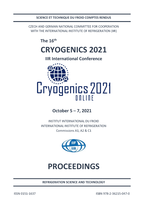
Document IIF
Modèle mathématique en régime permanent pour un caloduc cryogénique en boucle avec mèche en silicium poreux cohérent (CPS) dans l’évaporateur à plaques plates.
Steady state mathematical model for a cryogenic loop heat pipe with coherent porous silicon (CPS) wick in the flat plate evaporator.
Numéro : 0008
Auteurs : MISHRA G. K., NARASIMHAM G. S. V. L., KARUNANITHI R.
Résumé
A steady state model of a Cryogenic Loop Heat Pipe (CLHP) working with liquid nitrogen is formulated. Gerner and co-workers [5] have developed a Loop Heat Pipe (LHP) with Coherent Porous Silicon (CPS) wick with a flat plate evaporator and water as the working fluid. A CLHP with similar evaporator configuration is studied here as it provides the ideal thermal control option in space applications. The model studies the effects of heat load capacity, operating temperature, and other parameters on its performance. It incorporates the two-phase flow regimes in the system. Thermodynamic properties of cryogen are calculated using the fundamental Helmholtz energy equation. Fluid inventory and compensation chamber size estimation is done concurrently. The objective of this work is the modelling and development of a CLHP. The optimum thickness of the CPS wick and the optimum pore radius are estimated for cryogenic applications.
Documents disponibles
Format PDF
Pages : 7
Disponible
Prix public
20 €
Prix membre*
Gratuit
* meilleur tarif applicable selon le type d'adhésion (voir le détail des avantages des adhésions individuelles et collectives)
Détails
- Titre original : Steady state mathematical model for a cryogenic loop heat pipe with coherent porous silicon (CPS) wick in the flat plate evaporator.
- Identifiant de la fiche : 30029004
- Langues : Anglais
- Source : Cryogenics 2021 online. Proceedings of the 16th IIR International Conference, October 5-7, 2021.
- Date d'édition : 05/10/2021
- DOI : http://dx.doi.org/10.18462/iir.cryo.2021.0008
- Document disponible en consultation à la bibliothèque du siège de l'IIF uniquement.
Liens
Voir d'autres communications du même compte rendu (36)
Voir le compte rendu de la conférence
-
Influence of cryogenic temperature processes on...
- Auteurs : BOLYUKH V. F., KRYUKOVA N., KATKOV I. I.
- Date : 15/05/2017
- Langues : Anglais
- Source : Cryogenics 2017. Proceedings of the 14th IIR International Conference: Dresden, Germany, Mai 15-19, 2017.
- Formats : PDF
Voir la fiche
-
Flow instabilities in long nitrogen cooling cha...
- Auteurs : FUCHINO S., FURUSE M., HIGUCHI N., et al.
- Date : 22/07/2002
- Langues : Anglais
- Source : Proceedings of the nineteenth International Cryogenic Engineering Conference. ICEC 19.
Voir la fiche
-
UNSTEADY CONDUCTOR HEATING PROBING WEAKLY AND S...
- Auteurs : KAMIOKA Y., CHUANG C., FREDERKING T. H. K.
- Date : 07/08/1983
- Langues : Anglais
- Source : [Refrigeration serving humanity]. Proceedings of the XVIth international Congress of Refrigeration.
- Formats : PDF
Voir la fiche
-
Study on the process of filling carbon dioxide ...
- Auteurs : LI J., SHI Y. M., WANG R. S., et al.
- Date : 05/04/2008
- Langues : Anglais
- Source : Cryogenics and refrigeration. Proceedings of ICCR'2008.
Voir la fiche
-
Investigation of instability of forced flow boi...
- Auteurs : KLIMENKO A. V., SUDARCHIKOV A. M.
- Date : 12/05/1998
- Langues : Anglais
- Source : Cryogenics '98. Proceedings of the Fifth Cryogenics Conference.
- Formats : PDF
Voir la fiche
